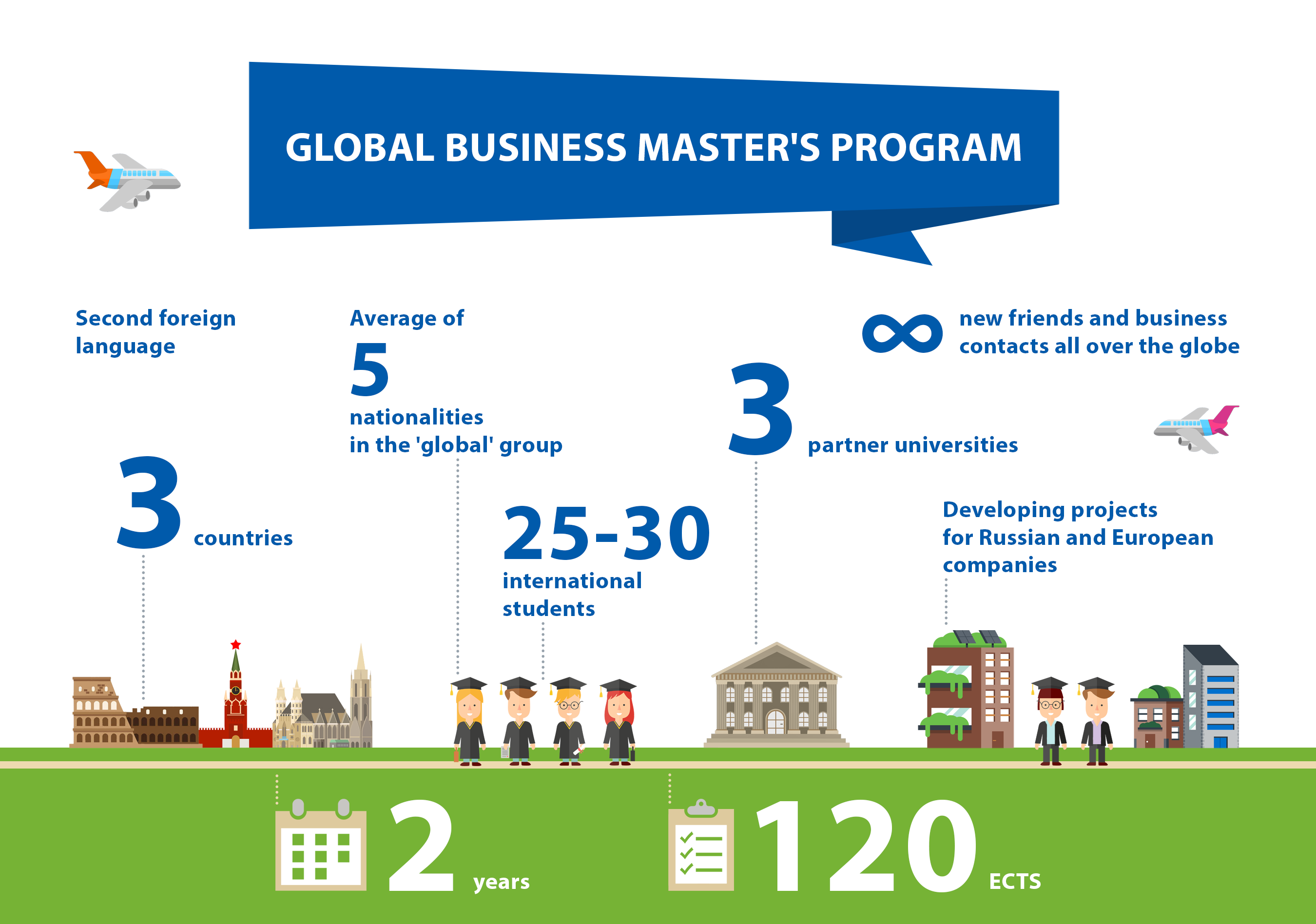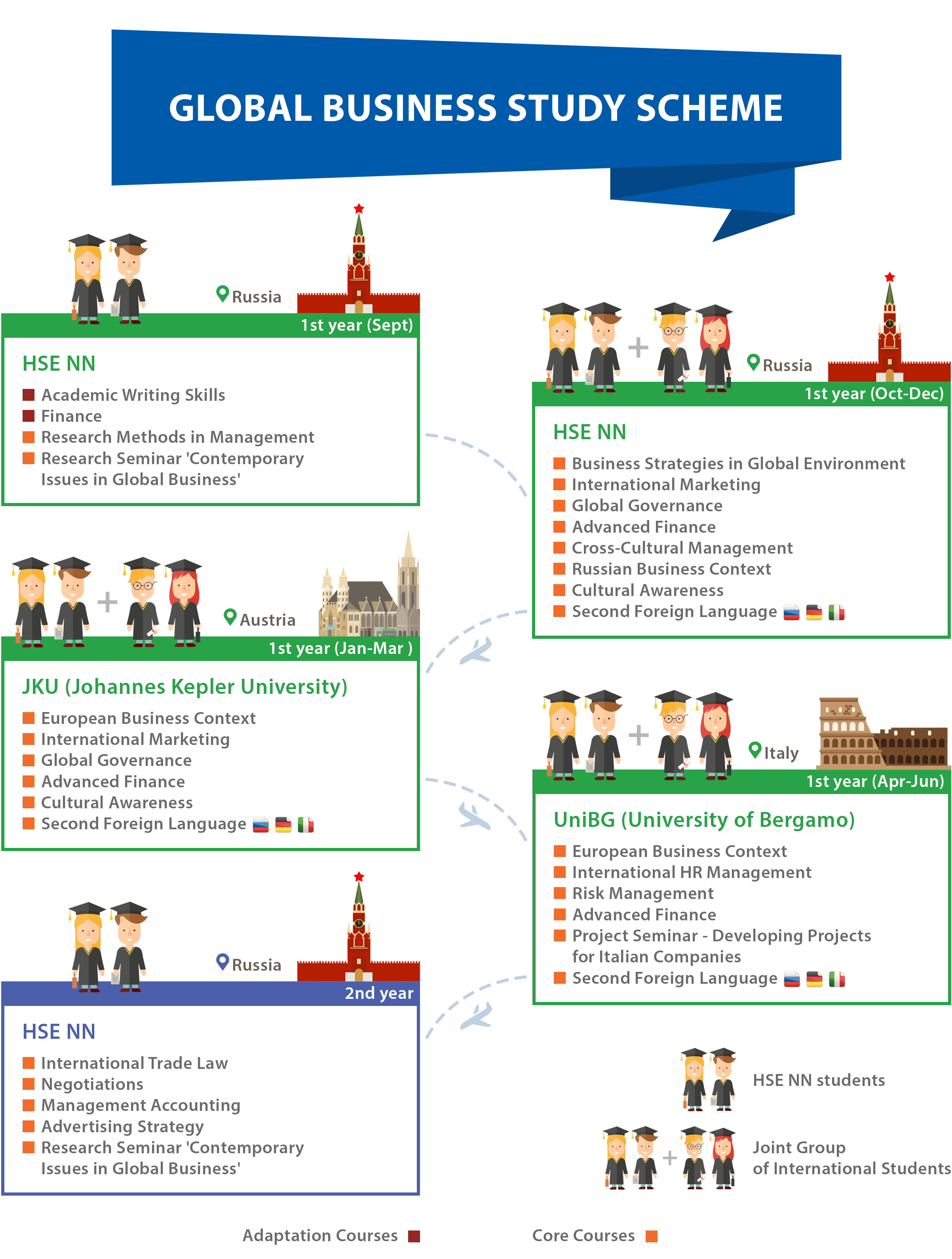Programme Overview
We prepare our students to take on management and leadership roles in international projects. These projects are directly based on the globalization of markets, high quality communications and the implementation of best international practices, on the one hand, and on the local business context of specific regions, on the other.

Why?
At present, the labour market is defined by express demand for world-class managers, who are fluent in English and equipped with knowledge about global trends in business and management, as well as capable of transmitting and adapting such developments locally. ‘Think global, act local’ has become the philosophy driving successful businesses.
Learn more
One of the key trends of the modern economy is globalization. Being strategic and long-term, this trend offsets any particular political situation in a given period of time. At the same time, amid all this globalization, regional differences are preserved and strengthened counter to what one might imagine. To denote the dialectical coonection between the global and the local, the concept of "glocalization" (Robertson, 1995) has been introduced. Training managers capable of effective problem solving in international companies, conducting business in the environment of a foreign culture, working in international teams should be based on both components of this trend. On the one hand, an international manager needs competencies that take into account the globalization of markets and business communications. On the other hand, they need to build upon local features of a particular region, its specific business context, and have the necessary level of linguistic and cultural training.
The content of the programme is determined by the needs of the labor market that requires managers who have the knowledge, skills and experience necessary to conduct business in the context of internationalization.
How?
Research* has shown that business leaders working in a global environment are most effective when their training/education includes: the ‘in’s and out’s’ of international finance and financial operations, country specificities, and intensive team work at the global level. Moreover, global experience can be applied practically when a future manager working in the international environment is motived to study foreign languages, pursue opportunities for reflecting on intercultural interactions, has worked with the challenges of cultural differences, and has been able to maintain views independent of the archetypes and stereotypes of his/her host country.
*Delmestri et al.; Caligiuri, 2006; Earley and Peterson, 2004; Leung et al., 2008; Ng et al., 2009; Ng et al., 2009; Mintzberg et al., 2002; Osland and Osland, 2006
Therefore, the focus of the GB programme is on:
- strategy,
- marketing,
- finance and national financial systems,
- the business context of target countries,
- negotiations and business communications,
- foreign languages.
For a complete course list, please refer to this page.

First year – international, daytime classes, full-time;
Second year – evening and weekend classes, compatible with a full-time job; options for further tailoring your educational track (through HSE internal mobility to Moscow or St. Petersburg or its’ foreign partner universities).
Why choose us?
Full study in English
Our Master’s students learn course materials, as well as carry out research and project work. As stipulated in the curricula of our three partner universities, this must be done within a single international group where the common language is English (the language of international business communication, which is not the first language of any of the participants). Therefore, undergraduates can upgrade their skills in professional oral and written communication in English, such as presentations, negotiations, development of business plans and projects.
Working as a member of multinational teams
From the beginning of the joint section of the programme, Russian students, alongside their classmates from Austria and Italy, are divided into international subgroups in which they receive practical skills for working on an international team along with intercultural reflection of group interactions. Furthermore, they can work on case studies that consider the specifics of doing business in Russia and the EU, as well as participate in the real business projects of Russian and European companies.
Working in international subgroups facilitates the mutual learning of students, especially in the framework of the project seminar (a trimester in Italy). Master students who have been trained in similar economic and managerial disciplines in different educational systems, can forward their knowledge and skills to foreign peers in these subgroups. Furthermore, enhancement of one's own competencies, as well as the development of another's competencies, occurs through reflection and group selection of best practices.
Gain exposure to international business environments
The programme is expressively practice-oriented. Each party of the joint programme ensures the immersion of students into real business environments. The educational process is accompanied by close cooperation with international and national companies, local experts and business practitioners.
Learn a second foreign language
In this context, learning the language of one of the host countries gains particular importance. HSE students have a choice among Russian, German or Italian. Language classes run from October to June. Thus, acquiring a second foreign language is accompanied by linguistic and cultural skills gained in a natural environment (in Russia, Austria or Italy, respectively). In addition, students can communicate with native speakers of the target languages during the whole international year.
Develop projects co-supervised by business mentors (in Russia and Italy)
The Italian part of the programme foresees project seminars where students can develop projects for Italian companies. Previous projects carried out in cooperation with these internationally active companies include: analyzing European market trends; studying consumer demand in the food and beverage industry; developing logistics strategies, as well as market entry strategies, for Russia and Austria; developing financial instruments for the Russian market; and analyzing the prefabricated home market in four respective countries.
In Russia, projects will be co-supervised by companies interested in entering the local market.
Delve into the authentic academic environments of three countries
The respective educational environment of each part of the programme overseen by our three partner universities is authentic. For instance, the archetypes of business culture in Eastern and Western Europe (e.g., Russia, Austria and Italy) are presented in a natural environment, through direct communication with teachers, tutors, and business actors from these regions.
Also, particular importance is given to the direct involvement of foreign professors. For instance, half of the instruction is carried out by foreign instructors (from Johannes Kepler University, Austria, and the University of Bergamo, Italy). Furthermore, the teaching staff from all three universities selected for the programme are well versed in global best practices, thereby ensuring the proper delivery of both the theoretical and practical components of the curriculum.
What does a GB graduate get?
- Diploma from HSE with a European supplement
- Certificate from partner universities confirming his/her successful completion of the international year
- Experience in developing (and implementing) projects in both Russia and Europe
- Networking within the global business community
- Career start: our graduates can work as managers and executives on international projects at global, foreign or Russian companies
How much?
Tuition fees come to 190,000 roubles per year. Please note that the programme is not available for scholarship funding.
GB students must also cover travel, accommodation and other expenses incurred during their academic mobility to Austria and Italy.
